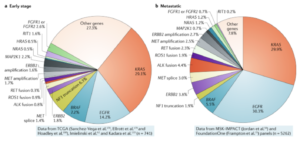Why Is Lung Cancer Biomarkers Testing Important?
Lung cancer, also known as carcinoma of lung, is a malignant lung tumor characterised by uncontrolled cell growth in tissues of the lung. The vast majority (85%) of cases of lung cancer are due to long-term tobacco smoking. About 10–15% of cases occur in people who have never smoked. Similar to many other cancers, lung cancer is initiated by either the activation of oncogenes or the inactivation of tumor suppressor genes. Carcinogens cause mutations in these genes that induce the development of cancer. In India, lung cancer constitutes 6.9 per cent of all new cancer cases and 9.3 per cent of all cancer related deaths in both sexes. Lung cancer is of two types mainly, i) NSCLC (no-small cell lung carcinoma) and ii) SCLC (small cell lung carcinoma).
Lung cancer especially NSCLC is a common type of cancer and all common cancers follows multiple genetically aberrant pathway to survive.
These are the genes that are linked with early and late-stage NSCLC.

This is very much evident that lung cancer (NSCLC) causing gene mutation is pretty high, and there are almost 9 FDA approved targeted therapy available for NSCLC. Immunotherapy is quite effective in lung cancer treatment as well. To know how effective immunotherapy would be, Tumour Mutation Burden (TMB), Microsatellite Instability (MSI) are the two genomic signatures to be tested along with protein Immune Check Point Inhibitor marker PD-L1 (Programmed Death Ligand).
Lung is an inoperable vital organ so the cancer diagnosed site can’t to operated and frequent biopsy isn’t possible too. So, it is always advisable to know the complete genetic make-up of the disease to plan effective, precise and personalised treatment. To know the complete genetic, make up one has to go for comprehensive molecular testing.
In India 4baseCare oncosolutions, the first illumina Accelerator Precision oncology company in Asia Pacific, that provide NGS (Next Generation) based precision oncology genetic test by comprehensive sequencing of Whole exome and transcriptome with affordability and reliability compared to other key players.
Recently, they have launched world’s first Indian population specific cancer gene panel named TARGT Indiegene on 15th of August in collaboration with several prestigious hospitals and research institutes of India (AIIMS Delhi, Fortis Bangalore, TMH Mumbai) with thorough research on diversified cancer types and subtypes of more than 1500 patients. Marking them unique and best for providing population specific cancer gene test for better treatment outcome based on novel genetic variants finding like gene fusion, RNA splice variants etc.


 Kindly fill the form below to download our Liquid Biopsy Portfolio brochure :
Kindly fill the form below to download our Liquid Biopsy Portfolio brochure :